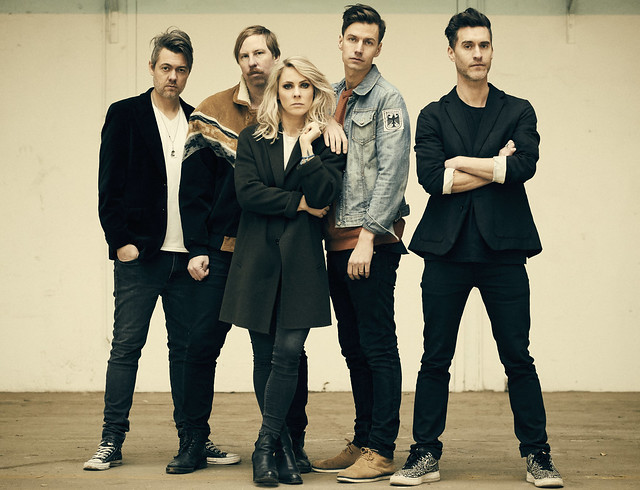
The Sounds (Photo courtesy Reybee Inc.)
The Sounds burst out of Sweden in 2002 with Living in America, blowing us away with fantastic new wave. The five-member band, fronted by Maja Ivarsson, then became the toast of the town with their hip second record, Dying to Say This to You.
Over the past 20 years, The Sounds have remained very busy while maintaining a consistent lineup. Key to that lineup is Jesper Anderberg, keyboardist, pianist, and guitar player — a versatile contributor and a thoughtful presence during The Sounds’ kinetic performances.
Mickey McCarter of Parklife DC caught up with Jesper to chat about Things We Do For Love, the upcoming sixth full-length album by The Sounds, scheduled for release on June 12, and about what he’s been up to the past few years.
This interview has been edited for length and clarity.
Mickey McCarter: I wanted to ask a bit about the new album, which is coming out in June. I’ve listened to it. It’s a wonderful album. I love everything by The Sounds, so I knew I was going to love it.
Jesper Anderberg: Thank you.
MM: What on the album stands out for you? What was it like working on it?
JA: Let’s start with the things that stand out. I really like the song “Changes,” because that’s one of those songs that I always wanted us to have — one of those little mid-tempo songs. We have a few mid-tempo, which I really love as well from the previous albums, but this is more of maybe an extension of the song, “Rock & Roll” from the first album but with more depth into it. Maybe a new version of that one, which I really liked! I like the whole groove, and I like the rhythm of it and the lyrics obviously. That’s one I’m really happy about from the album.
I also liked the song “Miami” because it’s weird and I liked the song, “Hollow.” Those three are the ones that I like the most.
Watch Maja Ivarsson and Felix Rodriguez of The Sounds performing new single “Safe and Sound” with the Helsingborg Symphony Orchestra on YouTube:
MM: Can you tell me about the process for making those songs? When you guys write, obviously, everybody in the band is making contributions, but I always felt like your contributions to the songwriting were particularly substantial. Do you sit down and write the melodies? How do you work with the rest of the band?
JA: Well, it depends on what album it is, but the previous albums, Dying to Say This to You, Crossing the Rubicon, and Something to Die For, I’ve mainly been working with Felix [Rodríguez], the guitar player. We’ve been exchanging ideas. We’ve been working shift work. In fact, it’s what they call it, skiftarbete, here in Sweden. Someone starts working and then they run out of fuel. Then the next guy comes in and takes it over and stuff like that. We were very on the same page with what we wanted to accomplish in the band of those, Dying to Say to You, Crossing the Rubicon, and Something to Die For.
Then after that for the Weekend album and for the EP, I started writing much more, with Fredrik [Blond], the drummer. He has a different approach to song writing, which at the moment, maybe suited me more. The whole writing process evolves over time with how you match with different people in the band and how you are on the same page and what you want to accomplish when it comes to how you want to move forward in this songwriting process.
For this album, the latest one, Fredrik also has been a big part of it. Also Maja [Ivarsson], she started writing again, which is really fun. She hasn’t been writing very much up until this album, except the first one. It was really good to have her back, which also made everything easier because you can hear her vocals right away on the songs instead of having mine or Fredrik’s or Felix’s vocals on the demo. For the la test album, I wrote a few songs for the album together with Fredrik and [bassist] Johan [Bengtsson] , before I took a little break from the band. Then Felix came back after a short break. He came back and wrote a few songs with Maja and Fredrik and then Fredrik wrote some songs by himself and together with Maja.
It’s an album where everybody has been contributing a lot, which is really fun. We haven’t done that really since the first album. Since everybody was taking breaks, we didn’t really see each other that much even during the recording. Maybe a song I wrote a long time ago together with Fredrik maybe sounded a little bit different when I came back. And that was really fun. It was a different experience than what we did in the past.
MM: Awesome. So, seven years since the last album, what have you guys been up to in that time? Normally, two or three years go by, and you had a new Sounds album, so seven years is a bit of a long time.
JA: I wrote songs together with Fredrik for that pretty EP that we released in 2016.
MM: Oh right. I forgot about that.
JA: I’m really happy with those songs and unfortunately they didn’t get so much attention because it was just only an EP. But after I did that, I had a kid that was born in 2016.
MM: Congrats.
JA: I took a well-needed break and did the family thing. Then, I felt like I needed to do something else to ignite the whole music songwriting, feeling I needed some other stuff in my life to get another angle in my songwriting. I started studying computer engineering for three years. Then, I had my kid as well. I have two kids! I started to into becoming a computer science engineer and wrote this last album. That’s what I’ve been up to.
Watch Jesper and Maja perform “Thrill” as a ballad for National Post Music on YouTube:
MM: Earlier, I love how you were talking about how this new album came together, and you were talking about “Changes,” and you were talking about “Rock & Roll” from the first album. I love that song. Like most Americans, I probably first heard “Tony the Beat” and then I was like, “Wait a moment. Who is this band?” Then, I went back and listened to the first album, and I was completely blown away by that song in particular. I love that you referenced that and how “Changes” follows on that format?
When you look back upon that particular time, do you feel like the band has progressed the way you would have liked? Have you been satisfied with everything that’s happened as far as the albums? There was a great deal of buzz, and it seemed like the band was really catching on, and then maybe, here in America anyway, we didn’t hear the third album as often. Now, there’s some buzz again, which is great, but do you have any feelings about how that’s come together?
JA: Yeah. It’s funny you mentioned it, because we actually had a discussion not long ago about this with a former A&R man or something, and we started discussing our career. We were talking about the career and what’s been good and what’s been bad and stuff like that. It’s hard to evaluate the whole career. It takes a little longer than just a phone call. But, I’ll try my best.
I came to a conclusion. Obviously, and I think that you can apply it to any career and any band, there’s stuff that you’ve done that’s completely right and there’s stuff, in retrospective, that you obviously did wrong. A lot of people think that we’re an under-rated band, and that we should have been maybe even bigger.
For me, it’s never really been about being like Coldplay big or anything like that. It’s more of being content with what you have achieved so far and what you’re proud of. We’re proud that we are really having any success at all. It’s a thrill for me to write and that I can still live on that, and it’s my occupation *and* my hobby. That’s the biggest success I’ve had in my life, except having kids.
With the career, we could probably make better choices when it comes to labels. That’s always something we fall back on. But at the same time, we also went through the whole record label collapse in 2006 onward. We’re still here, and we can still pay our bills and play live. And we can still record albums. We can still do this thing that we have built for so long. There’s a lot of bands that can’t do it anymore.
That’s something I’m really proud of — that we actually survived, even when the EDM world took over dance music. No one listened to bands that have a guitar anymore. It’s actually turning a little bit now. People want to see real live shows where people play their instruments. There are younger bands that play their own instruments and don’t use laptops and stuff like that. There’s a shift in how people look at music. And we have always been there, so we’re dinosaurs now, but at the same time, those dinosaurs might be pretty fun to watch. Do you know what I mean?
MM: I do.
JA: Obviously, there are things we could have done better when it comes to the business side, but we love the songs we’ve been writing. How other people promote them or market them, that’s not up to us. We’ve always done what we think with the songs.
MM: I ask with the very best of intentions because I think you guys should have been huge. You came up alongside other European bands that I love to listen to like Franz Ferdinand and maybe a lot of those bands haven’t been touring America too much in recent years. Again, the very best intentions there behind that question.
JA: I hear you. I understand.
It is an interesting question. I don’t know how you measure success. Maybe more albums sold, but at the same time, where we’re from Sweden, we don’t sing in our home language. There’s a lot of things that could come into the picture. But I’m super proud of our career, and I couldn’t be more happy where we are at the moment. When you start talking about it, there’s obviously things you think, “Ah, I should have done that in retrospect,” but I’m happy.
Watch the official music video for “Tony the Beat” by The Sounds on YouTube:
MM: With regard to “the sound” of The Sounds, and what inspires you, I once had an opportunity to chat with you briefly some years ago before you performed in New York, and you told me that you loved Billy Currie of Ultravox.
That blew me away. In my opinion, that period of music where you had Roxy Music and you had David Bowie, and then what was going on in England in the late ’70s with the New Romantic period with Ultravox and all of those bands, to me, that was the most significant period ever in modern pop music history. The sound of those musicians, the melodies of the music, everything that comes out of that, it is great to think that that’s an important part of your alchemy as well when you write songs.
JA: Yeah. That’s been a huge influence on us. I actually talked about Ultravox with my brother, my older brother. My older brother was the one that introduced me to them when I was maybe 15 or so. Billy Currie was supposed to play here at The KB this year, but of course it’s been canceled.
It’s interesting you say this because I started listening to Ultravox again maybe three months ago, because I felt like there’s still something with Ultravox that I hadn’t really touched when it comes to inspiration. I listened to one of their live albums that they released maybe 10 years ago [Return to Eden: Live at the Roundhouse]. They had a reunion 10 years ago, and I was so impressed with how they actually sound still. Maybe they’re pretty old, but if you only listen to the music, they actually play with such energy still. Ultravox brought Warren Cann back on drums. He left sometime after ’85, and everything changed.
That’s also something that Ultravox has reminded me about, to take away one person in the band, and everything can change. It doesn’t matter if it’s the drummer. Obviously the lead singer is special, but take away the drummer, the bass player, the guitar player, even if they’re not songwriters, it’s going to sound different. That’s what happened when Warren Cann left Ultravox. Everything just changed.
But for sure, that band has definitely had a huge influence on me, especially the keyboards, the whole melancholic vibe of music where they have lyrics that are kind of artsy and the same time have real depth.
I always think our song “Painted By Numbers” as our reference to Ultravox. We have a Swedish word that’s called [untranslated – editor]. It means “dark but happy at the same time.” That’s something Ultravox definitely taught me when it comes to songwriting. Even if you’re a happy person, you can still write dark songs that sound cool but are actually happy.
That’s Ultravox to me.
Watch the official music video for “Painted by Numbers” by The Sounds on YouTube:
https://youtu.be/t_yelC4FqIA
MM: One of my favorite moments in a concert by The Sounds: There’s always a moment where Maja and you are alone on the stage for a number, and it’s usually a bit of a melancholy moment. You did it again most recently when you did the livestream from The KB and you and she played “Something to Die For.” I always loved those moments, and I was hoping that you provide some insight into them.
JA: I don’t know how it started. I’m a piano player. I started playing piano when I was a kid and I always loved piano. That’s also an Ultravox thing. They incorporate piano in their songs, which if you do it right, it can be magic.
When we started playing the first album, I wondered, “Where am I supposed to play piano in this band?” For the second album, I wrote “Painted by Numbers,” which had a piano solo in it. I was like, “No, that’s it. That’s good enough. I’m on my way somewhere.” Then, we did “Night After Night.” First we did a fast version with the piano, and then we did a ballad. And I said, “Finally, here I have a song,” and then we started playing it.
I recall Maja being pretty scared of singing with no beat and just piano. We had to play it then over and over again, and now she’s really great at it. For me to play with Maja now, it’s such a relaxing moment for me, and I really, really enjoy it every time. Plus the other guys can take a five minute break.
I always tried to incorporate a piano ballad, even if we play short sets because it feels like a nice moment. And as you said, it seems like it affects people, and since we have such an energetic set when we play, it’s good to have something slower and more thoughtful.
Watch a livestream of The Sounds performing at The KB in Malmo, Sweden, on April 17, 2020:
MM: Definitely. You were supposed to be on tour of the United States right now, and you would have played here in Washington, DC, and I was really looking forward to seeing you at the Black Cat. But we don’t get to see you yet, but soon hopefully. So, you did a livestream and you played to nobody at The KB in Sweden.
How was that? Was it good? Was it weird? It was such a success by the way. It was a smashing success. If somebody’s watching it live at the time, it was such a great show and such a needed jolt of life for everybody. How was it to be there and play to an empty room?
JA: It was definitely weird, but it was obviously most uncomfortable in the beginning for Maja. She’s in the front. Usually, I’m in my own space when I play, even if there’s people. It was like a long soundcheck in one way. Sometimes soundchecks are the greatest, because you get to play the songs a little bit more relaxed and fool around a little bit, which I like. So, I didn’t really notice it until the first song was over because that’s usually when people applaud or cheer after a song.
You take that for granted when we play as much as we have. When the first song stopped, and it was completely empty, that was a really weird feeling. Then, we started playing real fast afterward for the second song, and then the camera team started to applaud after the third song. That was even more awkward because it was like, “Okay, we’re playing in front of people but there’s only five people there.” It was like we were back in 1999 again, no crew and no audience. That’s how it was in beginning. But at the same time, it was the same five people on stage.
Some part of me felt like, “Okay, there’s people actually watching this so we’re not completely alone.” I don’t know how else to explain it. I saw it afterward, a little bit of it, and that felt really good. The guys who did the video did a great job as well. The sound was good.
MM: It was very good.
JA: I just hope that everybody that watched it was happy. I was happy! I’m always happy.
MM: We’ll be happy when you can reschedule the tour! This fall, maybe?
JA: We have plans for the tour to start somewhere in the fall, and we’re hoping for it to happen but no one really knows. We have a few concerts, a few shows here in Sweden this summer, big ones with The Hives. It doesn’t look like they’re going to happen at the moment. No one really knows. There’s places that are closing down. It’s a real mess. I’m just hoping for the best and that in the fall we can start touring again.
If that’s not the case, we’re definitely going to do it as soon as we can.
**
Thanks to Jesper for being so generous with his time!
For more music and tour dates by The Sounds, visit the band’s website.






